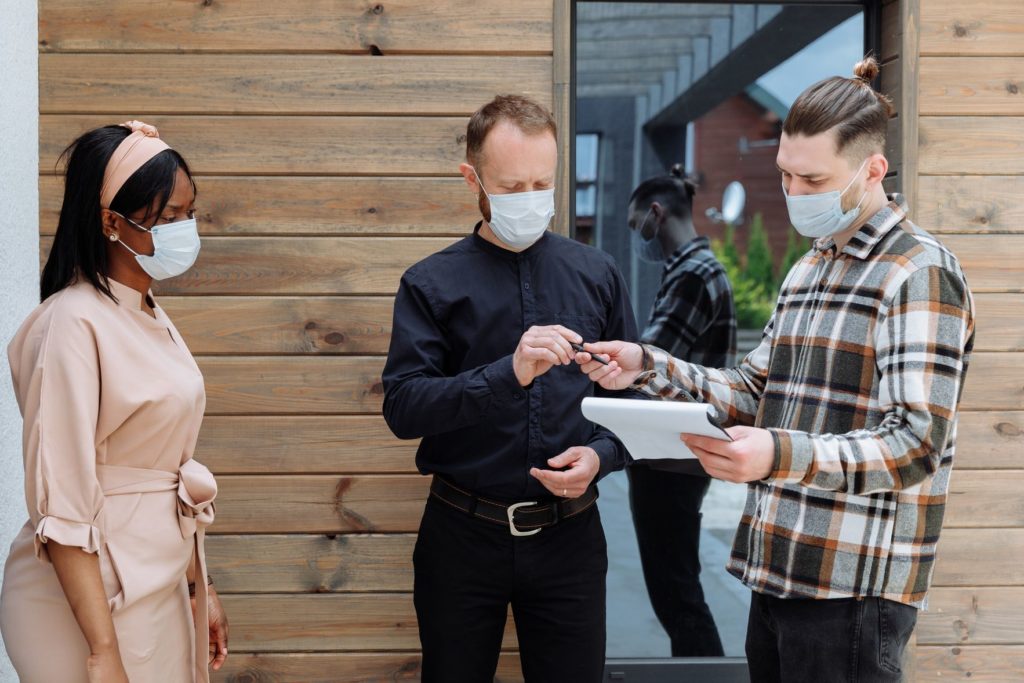The average American moves more than ten times in a lifetime, so there is plenty of room to get better at it over the years. Practice makes it perfect, right? However, we can teach you how to move out for the first time and be successful even if you’re inexperienced. All you need to do is follow our tips and prepare yourself for stepping into adulthood.
Prepare for the Emotional Roller Coaster Called Moving for the First Time
Many people feel anxiety about relocating from their parents, and that’s not without a cause. It is a huge step outside of the comfort zone for anyone, which is why it’s bound to bring mixed emotions. You’ll experience many feelings simultaneously, from nervousness and fear to thrill and excitement. Sadness from leaving friends and family will be replaced with enthusiasm for the new possibilities until your thoughts go back to soon-to-be-missed loved ones. This kind of life change is a lot to bear, so prepare for your emotions to be all over the place.
Leaving the nest and the watchful eye of your parents can seem liberating at first, but soon you’ll start questioning everything. At what age should you move out? Is it too soon? Are you ready to become self-reliant? Yes, changing the lightbulb is a piece of cake, but have you actually ever done it? And how in the world do you start paying taxes? These kinds of questions can be intimidating, but the key is to stay focused on the benefits of relocation. You’ll learn to become independent as days (and years) pass, but remember that not many things bring significant opportunities the way a relocation does. There is so much to gain from the move, so focus your thoughts on that.

Become a Pro at Money Management and Take Care of Budgeting
One of the first skills to master when becoming an independent adult is taking care of finances. Boring, we know, but necessary nevertheless. Keep in mind that you won’t have the financial safety of living with your mum and dad after relocating to another state alone.
First of all, ensure that you’ll be able to afford the new life. Make a monthly expenses checklist that will include the cost of:
- Rent – when you first move in, you’ll need to pay the first month’s rent, deposit, and sometimes even the last month’s rent. Ensure that the money spent on rent doesn’t surpass 30% of your monthly income;
- Transportation – figure out if it would be wiser to get auto transport services and transport your vehicle or rely on public transportations when commuting;
- Groceries and utilities;
- Taxes – tax expenses (and types) vary from state to state, so ensure to know how much money you’ll be obliged to pay to the government after the move.
So how much money should you have saved before moving out? It would be best to save up the amount that will cover three to six months’ worth of expenses. However, keep in mind that the cost of living in NYC, for example, is drastically different from Wichita, Kansas. In order to know how much to save up, research what it would cost to live in a particular destination and then budget accordingly.
If your future place of living proves to be too expensive, consider some options to make it less so. How do you feel about having roommates? Remember that shared costs are one of the best ways to make higher living expenses more bearable. Search sites and apps like Roomie, and find your best match.
Don’t Forget to Budget for the Move
When making financial plans, don’t forget to include the cost of the interstate relocation in planned expenses. Will you opt for getting long-distance moving services or take chances with a DIY move? And if you decide to hire a relocation company, will some of the additional services, such as a storage service, be necessary? All of that will affect the final cost of the relocation, so see how much money is at your disposal and plan the move accordingly.
Get a Job Before Moving Interstate and Improve the Income to Expenses Ratio
Knowing that you’ll have financial security immediately after the move can relieve you of some relocation stress. Relocating without a job is not ideal, but luckily, there are ways to find one even before the move occurs. Visit job websites and apply online, update your LinkedIn info, and start networking. Hopefully, something will come up, but even if it doesn’t, you’ll get a sense of the job market in the future city. The same goes if you’re relocating to college and need to get an occasional job to cover your tuition or living expenses.

Hire State to State Movers
If you decide that more stress on top of your already overwhelmed mental state should be avoided at all costs, note that hiring movers is the best option. They will bring you as close to a stress-free relocation as they can and help you move efficiently and safely across the country. Long-distance movers and the packing services they can provide will allow you to commit to other important relocation tasks. So, ensure to choose a relocation company with the best track record and recommendations. Let them deal with packing and other tedious tasks so you can start getting your new life in order.

How to Move Out for the First Time? Create a Moving Out for the First Time Checklist
Hiring movers doesn’t mean that there is nothing else to be done before the relocation day. Lots of work still awaits. If you want to organize a move right, remember that the first time moving out checklist should contain tasks like:
- Decluttering – decide what to get rid of and what you want to keep from the old home before packing starts;
- Organizing important documents – birth certificates, school and medical records, bank-related paperwork, and other similar documentation are part of relocation essentials. Ensure you have them all before the move;
- Changing your address – it’s a two-minute process on the USPS’s website that can spare you some unnecessary headaches after the move;
- Informing others about to move – aside from your family and friends, there are many other important subjects you would want to notify when relocating (insurance and loan providers, banks, and the like);
- Getting packing materials and learning a few useful packing tips – skip this task if you decide to hire professional packers;
- Updating the driver’s license and voter registration – ensure to do it shortly after the relocation to another home;
- Create a list of items needed for the future apartment – get what you can from the old home and make a shopping list for everything else necessary.
Do You Want to Be a Responsible Adult? Getting Insurance Will Set You on That Road
Being an adolescent brings a feeling that you’re somewhat indestructible and that nothing can harm you (yet). However, the more mature a person gets, the more they realize that bad things happen. One of the ways of fighting them is getting insurance. Maybe you can’t stop accidents from happening, but moving, health, and renter’s insurance can ensure your life continues to flow almost uninterrupted after it. As for health insurance, know that being on your parent’s insurance program is still an option (pretty independent, right?), but only if you are under 26 years of age. Otherwise, you need to get your own policy, alongside finding a new primary doctor, dentist, ophthalmologist, and the like.

Things to Know When Moving Out And Renting Your First Place
Renting a place is not a simple task – after all, you’re choosing a space that will be your home, at least for a while. When planning the move to another city and looking for an apartment, three crucial things to consider are the price, condition, and location. One of the most common mistakes young adults make is having expectations that are too high. Keep in mind that you probably won’t find an ideal place to live in, which is why it’s necessary to make a list of essential features. Think about what the future apartment (and neighborhood) must have – low costs, short commute, safety, close amenities, clean building, lots of natural light, and low noise pollution are just some of the desirable features.
Troubles That Can Come From Renting an Apartment Without Previous Rental History
After finding the condo you like, the next step is applying for it. Before offering you a lease, the landlord (or property manager) must conduct a background check. Ensuring tenants are of good character, have good credit scores, and have excellent rental history is how landlords protect themselves.
But what to do when a renal history is non-existent? Many landlords will let you live in an apartment even if you have no previous rental experience as long as there is a co-signer. A co-signer is a person who carries all financial obligations in case you don’t meet them. The same applies to a tenant who has a poor credit score. Don’t leave anything to chance – finding a person willing to guarantee for you is one of the things to do when moving to another state.

Don’t Hesitate to Talk to Your Loved Ones When You’re Feeling Down
Saying bye to friends and family is an emotionally difficult experience. Relocating to another state, however, doesn’t mean that people you’ve known your whole life won’t be there when you need them. Your loved ones were your safety net before the move, and they can continue to be so from afar. They may live thousands of miles away, but nowadays, it is simple to find ways to keep in touch. Remember – when you begin missing the old home, your friends and family are just one call away.
Start Working on New Friendships
One more way to help you feel less lonely is to start making friends in another city. It’s not necessary to go out of your way to do so. Begin with simple small talks with colleagues and meet new neighbors on the way to the grocery store. It’s only natural to be compatible with people who share the same interest as you, so try meeting people from the gym, book club, crafting class you attend, and the like. For more suggestions on how to meet more people, watch the video below:
Practice Being an Adult Even Before the Move
All of the tips we provided must be combined with good habits before relocation. You can’t relocate several states away without knowing how to do laundry, iron shirts, and do other basic chores! Keep an eye on your spending tendencies and start putting your organizational skills to good use. And remember – the first sign of becoming an adult is making your own appointments. So, how do I prepare myself to move out for the first time, you ask? Practice being a grown-up even before you’re forced to be one and put our tips to good use. By doing so, there will be no mistakes, and your first relocation will be deemed a success.












